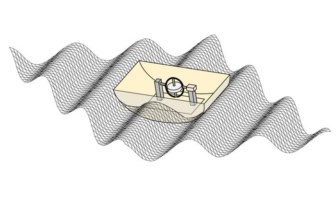The darker side of Isaac Newton is the theme of a new play currently on show at the New End Theatre in London. Written by the chemist Carl Djerassi, "Calculus" examines Newton's famous dispute with the German mathematician Gottfried Leibniz over who invented calculus first. The play does not tell the story, as might be expected, through the eyes of Leibniz and Newton. Instead, it centres on three lesser known scientists whom Newton may have deliberately manipulated into publishing a report in his favour.
The 30-year-long dispute between Leibniz and Newton over who invented calculus first is a famous tale. However, little is usually mentioned about the 11 fellows of the Royal Society who published a report defending Newton’s claims to priority in 1712. In this new play, Carl Djerassi re-opens the case and revisits history through the eyes of its lesser characters. It is also the final play of his “science-in-theatre” trilogy, following An Immaculate Misconception and Oxygen, which was co-written with Roald Hoffmann.
The main characters in Calculus are not, as might be expected, Leibniz and Newton, who was then president of the Royal Society. The play centres instead on three of the “minions” whom Newton may have manipulated into publishing a report in his favour: John Arbuthnot, Abraham de Moivre and Louis Frederick Bonet. Following in the steps of Tom Stoppard, who explored Hamlet from the viewpoint of two minor characters in Rosencrantz and Guildenstern Are Dead (and Rosencrantz and Guildenstern are duly mentioned in Calculus), Djerassi has chosen to debunk the myth surrounding Newton, showing him to be a “tainted hero” through the eyes of the lesser-known players of history.
The intimate space of the New End Theatre in London is an excellent venue for this exploration of the human side of history, as it strengthens the play’s atmosphere of secrecy and confession. Set in the back room of the Drury Lane Theatre, the plot takes us, quite literally, behind the scenes of history. The action begins in 1725, when Sir John Vanbrugh visits the theatre manager Colley Cibber (who were both real playwrights) to ask him to stage a play about Newton’s manipulation of the committee.
The events of 1712 are then presented as a play-within-a-play, with the two playwrights providing commentaries and occasionally acting the parts of Newton and Leibniz. The committee’s lack of authenticity is thus highlighted by a plot full of artifice and a stage covered with cardboard clouds, period costumes and other obvious theatrical props. Djerassi uses the device of the play-within-a-play to denounce the Royal Society’s deliberations as no more than a drama written by Newton himself. The latter’s manipulating role is made obvious by the fact that the same actor (David Gant) plays both the playwright Vanbrugh and Newton.
As in Tom Stoppard’s Arcadia and Michael Frayn’s Copenhagen, science is used as a metaphor: “calculus” refers not only to maths, but to the characters’ moral and political calculations. In fact, the play contains very little maths, with the exception of a comical scene in which de Moivre illustrates calculus by eating an apple (of course) at varying speeds and then calculating his velocity at a given point in time.
Djerassi has written that his plays aim to be both entertaining and instructive, and to bring serious scientific content to the stage. Supported by an excellent cast, Calculus is certainly entertaining, but its scientific content is historical rather than mathematical: the play is more concerned with the politics and power-struggles of science than with Newton’s invention.
“There are no heroes in this play,” remarks one of its characters. By insisting that we do not separate a scientist’s ethics from his achievements, Djerassi not only undermines Newton’s status as national hero, but also criticizes our need for mythical scientists — the fact that “a country requires heroes…unsullied ones”.
Calculus, directed by Andy Jordan, will be on at the New End Theatre until 28 August (tel. +44 (0)870 033 2733; Web www.newendtheatre.co.uk). The text of the play appears in the book Newton’s Darkness (2004 Imperial College Press), which also contains a transcript of Newton’s Hooke by David Pinner



